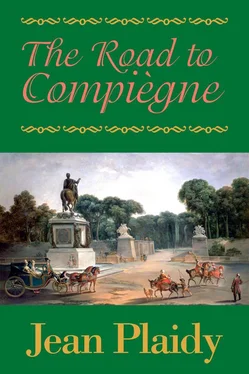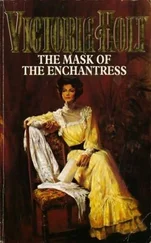The Parlement then announced that the Bull Unigenitus was not a rule of faith, and the clergy were forbidden to treat it as such.
With the Archbishop in exile and the Parlement in Paris the tension relaxed.
* * *
At this time Madame Adelaide had become astonishingly subdued, and her cunning Mistress of the Robes, the Comtesse d’Estrades (the woman who had failed to replace Madame de Pompadour with the Comtesse de Choiseul-Beaupré), determined to exploit this situation. Certain suspicions had been aroused and, recalling an occasion when, during a theatrical performance at Fontainebleau, Madame Adelaide had fainted, Madame d’Estrades believed she knew the reason for the change in the Princesse.
‘I was overcome by the heat; it was unbearable,’ Madame Adelaide had moaned.
But, reasoned Madame d’Estrades, the other ladies had not been overcome by the heat.
Madame Adelaide’s very full skirts could be concealing. Was it possible that the King’s beloved daughter was about to bring scandal to the Court?
She was not of course the only one to notice this change in Adelaide; and when the latter left Versailles for a month or so there were many to suggest the reason.
‘Was it not inevitable?’ asked certain members of the Court. ‘Adelaide was adventurous; the King refused to arrange a marriage for her, and it was, if one considered all the circumstances, only to be expected. But a scandal! Particularly if . . .’
But it was unwise to continue with such a conjecture.
Others said: ‘They say it was the Cardinal de Soubise. He and Adelaide have become very friendly indeed.’
‘The Cardinal de Soubise! But that is very shocking.’
‘Yet not so shocking as . . .’
Eyebrows were lifted; fingers were put to lips; that was something which might be thought , but which it would be more than one’s position – perhaps one’s life – was worth to put into words.
So Adelaide returned to Court, a little less vivacious, a little cautious, not quite the hectoring princess who had amused them before.
The King’s attitude appeared to have changed. It was clear that he no longer felt the same affection for her. Perhaps she herself was more unbalanced than she had been; perhaps she had ceased to be very young, and that outrageous behaviour which was amusing in a young person could become exhausting and wearying in an older one.
Louis revived old nicknames for his daughters. Adelaide was ‘Loque’, Victoire ‘Coche’, Sophie ‘Graille’ and Louise-Marie ‘Chiffe’. When they were children these unflattering names had been given affectionately; now it seemed that the affection had been withdrawn and they expressed Louis’ growing contempt for his daughters.
The attitude of the King could not fail to have its effect on the Court, and many were becoming not quite so respectful to Madame Adelaide as they had once been.
The King made a habit of inviting her to play on various instruments for the amusement of himself and a few friends. Like her mother, Adelaide was no musician and, also like her mother, she believed she performed excellently.
Adelaide would sit at the instruments, playing with vigour and producing a great deal of noise, while the King applauded with apparent enthusiasm; and the more inharmonious the sounds produced, the louder was the applause. The courtiers followed the example of the King and applauded with him, while Adelaide smiled complacently, refusing to believe that she was not a great musician.
Louise-Marie implored her not to allow herself to appear so foolish, at which Adelaide tartly retorted that her sister should curb her jealousy. Whereupon Louise-Marie merely shrugged her shoulders and turned away.
This was an example of how the King’s feelings had changed towards his eldest daughter; and Madame d’Estrades decided to make the most of the situation.
Her lover, the scheming Comte d’Argenson, had not given up hope of driving Madame de Pompadour from Court, and his mistress shared his determination. Adelaide seemed a good tool to be made use of. Madame d’Estrades therefore began to feel her way in that direction. As Mistress of the Robes she had her opportunity.
One day Adelaide declared her intention of wearing one of the most costly of her dresses – a rose-coloured satin gown embroidered with stars and trimmed with gold ornaments.
The dress was not in her wardrobe.
‘Then where is it?’ Adelaide demanded petulantly.
‘You have forgotten, Madame,’ said the Comtesse d’Estrades, ‘you gave that dress to me.’
‘I . . . gave it to you! But I am sure I did not.’
‘Oh yes, Madame.’ The Comtesse looked sly. ‘It was at that time when you were planning to leave Versailles . . . for a spell. You may have forgotten. I have not. The skirt of that gown was a little tight . . . I think.’
Adelaide’s eyes flashed in the old manner, but a cautious
look crept into her face.
‘I see,’ she stammered. ‘I . . . had forgotten.’
After that clothes began to disappear from her wardrobe, and although she hated the Comtesse d’Estrades, she was afraid to dismiss her.
* * *
This state of affairs went on for some time, and Adelaide no longer appeared in the flamboyant dresses which had once delighted her. Madame de Pompadour noticed that her shoes were quite shabby and that she sometimes went without stockings.
It was not difficult for the Marquise to find out what she wanted to know. She despised Madame d’Estrades and she did not forget what part she had played in the Choiseul-Beaupré affair. She would not wish to appear to take revenge on the woman for that, because she preferred to let the Court think that the matter was of so little importance to her that she could afford to ignore it. However she now saw a way of ridding the Court of an undoubted enemy and at the same time turning another enemy into a friend.
She asked Madame Adelaide to receive her. It was significant of the changing personality of the Princesse that she agreed to do so; and the Madame Adelaide whom the Marquise found waiting for her was a different person from the haughty, headstrong young woman of not so long ago.
The Marquise behaved as though they had been lifelong friends instead of enemies; and Adelaide, who had been reduced to a state of nervous tension by the cruel Madame d’Estrades, felt almost affectionate towards the kindly Marquise.
‘Forgive my coming to you in this way,’ said Madame de Pompadour, ‘but I believe you are less happy than you used to be, and I would like to consult you about a certain evil woman in your service.’
‘Pray continue,’ said Adelaide eagerly.
‘I refer to Madame d’Estrades.’
Adelaide clenched her hands and seemed to hover between an outburst of fury and a collapse into tears.
‘I believe her to be intriguing with her lover,’ went on the Marquise. ‘I do not think she is a woman to be trusted. But she is your Mistress of the Robes and I hesitate to use any influence to have her removed without your permission.’
Adelaide sought to retain her dignity. ‘If this woman is guilty of intrigue, I should put nothing in the way of her removal.’
‘Then I have Your Highness’ permission to proceed with my inquiries and, if I find my suspicions to be well founded, to have her removed?’
‘You have my permission,’ said Adelaide; and her eyes were shining with joy at the prospect of being released from a position which was becoming more and more intolerable.
A few weeks later Madame d’Estrades was ordered by the King to leave Versailles for Chaillot. Her dismissal from Court was brought about with great care; for it was not forgotten that she was the mistress of the powerful Comte d’Argenson and that she was privy to secrets of Madame Adelaide’s. Therefore she was given a large pension with her dismissal and she retired in some state.
Читать дальше








